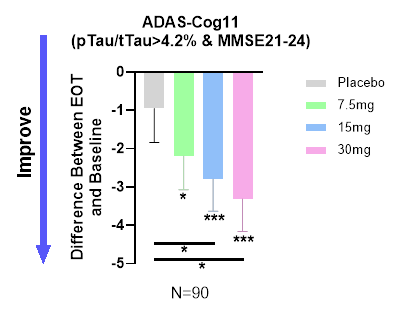- Significantly higher rate of improvement in ADAS-Cog 11 scores in each treatment dose relative to placebo for patients with mild AD
- Improvement in cognition measured by ADAS-Cog 11 at three months is 3.3 points as compared to 0.3 for placebo, consistent with our previous Phase II AD/PD and Discover studies
- Plasma Tau protein levels are reduced, consistent with our previous Phase II biomarker data
- Based on the findings of this symptomatic study, Annovis plans to conduct a pivotal disease-modifying Phase III trial in biomarker-positive early AD patients
We observed a significantly higher improvement in ADAS-Cog 11 scores in each treatment dose relative to placebo for patients with mild AD. The analysis focused on biomarker-positive early AD patients (MMSE 21-24, pTau217/tTau≥4.2%) found that ADAS-Cog 11 was highly statistically significant at all 3 dose levels and in the combined dose levels compared to placebo as well as to baseline (Figure 1). This objective measure of cognitive function confirms our findings from the two small Phase II studies that showed improvement in cognition in mild AD patients (Fang et al. JPAD 2023). The treatment response in the current study was not related to a patient’s age or sex.
Note 1: AD biomarker field has fast accelerated in the past few years. When we initiated the study in January 2023, the gold standard for measuring Alzheimer’s-related amyloid and tau biomarkers were CSF and PET scans. Clinically validated plasma biomarkers became commercially available in 2024 and have been shown to be similar or superior to CSF biomarkers (Ashton et al. JAMA 2024, Barthelemy et al. Nat. Med 2024, Meyer Alzheimer’s Dement 2024).
Note 2: Our initial recruitment did not prescreen patients for AD biomarkers in plasma. When we became aware of issues from other AD studies with sites recruiting non-AD patients, we fast-tracked biomarker measurements by collaborating with C2N Diagnostics. This enabled us, when we unblinded the data, to tell which patients had confirmed AD and which did not (Ashton et al. JAMA 2024, Barthelemy et al. Nat. Med 2024, Meyer Alzheimer’s Dement 2024). Out of 325 patients who completed the Phase II/III trial, 202 had a ratio of pTau217/tTau≥4.2% that indicates AD. We further subdivided the patient population into moderate (MMSE 14-20; 112 patients) and mild (MMSE 21-24; 90 patients) AD patients. These two selections were not pre-specified analyses.
Figure 1. Dose-dependent improvement in cognition in the population with confirmed early AD.
At the end of 3 months of treatment, placebo group demonstrated slight improvement (LSM(SE), 0.26 (0.91)), but not significantly different from baseline. All three buntanetap treatment groups showed statistically significant improvement from their corresponding baseline (7.5mg improved 2.19 (0.87), p=0.013; 15mg improved 2.79 (0.81), p=0.001; 30mg improved 3.32 (0.82), P<0.001). Both 15mg and 30mg treatment groups also had a statistically significant improvement relative to placebo group (p=0.042 and 0.015 respectively). EOT- End of Treatment * P<0.05; ** P<0.01; ***P<0.001
Summary
- Buntanetap, a once-daily oral medicine with an exquisite safety profile, improves ADAS-Cog 11 score in a dose-dependent fashion to the mean of 3.3 points. The data is highly statistically significant in a subpopulation of early AD patients, confirmed by multiple data and biomarker analyses
- Efficacy strongly correlates with disease stage at entry (as measured by MMSE)
- Efficacy in the CGIC endpoint was not reached due to the limited number of patients and short trial duration
- In accordance with the mechanism of action, buntanetap lowered tTau levels, suggesting a disease-modifying effect
- As seen in all previous studies, buntanetap is safe and well tolerated.
Next Steps
This short study shows a symptomatic effect with a possible disease-modification trend according to the tau data. The next study will have a longer duration, improved design and be statistically powered to validate symptomatic improvement and disease-modification.
Annovis will report the data to the FDA and ask for an end-of-Phase II meeting. We expect to discuss the data with the FDA in the next two to three months and then move on to the next Phase III study to confirm and expand these findings in an 18-month disease-modifying trial focusing on biomarker-positive early AD patients. We further plan to present the data at the AAIC2024 and to publish it in a peer-reviewed journal.

No comments:
Post a Comment
Note: Only a member of this blog may post a comment.